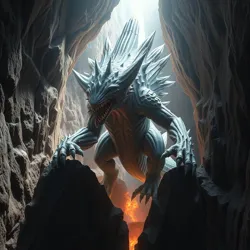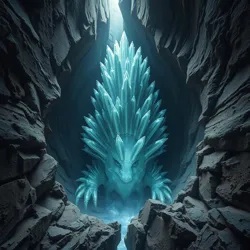Tectonic Render Beast
The Tectonic Render Beast is a colossal subterranean entity that dwells within Earth's tectonic plate boundaries, known for its ability to create devastating localized earthquakes. These ancient creatures are distant relatives of the Lithospheric Titans and are considered among the most destructive of all known Deep Earth Entities.
 A Tectonic Render Beast's crystalline form visible through a deep fault line
A Tectonic Render Beast's crystalline form visible through a deep fault linePhysical Description
Tectonic Render Beasts possess massive, crystalline bodies spanning several kilometers in length, composed of ultra-dense minerals formed under extreme pressure. Their most distinctive feature is a series of crystalline protrusions called pressure spines that allow them to manipulate tectonic forces. These beings can alter their density at will, enabling movement through different layers of the Earth's crust.
Habitat and Territory
These entities primarily inhabit the spaces between tectonic plates, particularly favoring:
-
Subduction zones
-
Transform fault systems
-
Deep oceanic trenches
Powers and Abilities
The Tectonic Render Beast possesses several unique capabilities:
-
Generation of localized seismic events
-
Manipulation of crustal pressure
-
Creation of fault line passages
-
Communication through deep-earth resonance
 Distinctive seismic signature pattern of a Render Beast's movement
Distinctive seismic signature pattern of a Render Beast's movementInteraction with Other Entities
Tectonic Render Beasts maintain complex relationships with various subterranean beings:
-
Territorial disputes with Magma Titans
-
Symbiotic relationships with Pressure Wraiths
-
Hunting of smaller Crystalline Entities
Impact on Global Geology
These creatures play a significant role in Earth's geological processes, contributing to:
-
Formation of new mineral deposits
-
Creation of undersea canyons
-
Development of unique geological formations
Study and Observation
The Deep Earth Research Institute maintains a global network of specialized seismic monitors designed to track Tectonic Render Beast movements and predict their activities. Their presence is often detected through distinctive pressure anomalies and unique crystalline formations in fault zones.
See Also
- Deep Earth Entities
- Tectonic Entity Classification
- Subterranean Ecosystem
References
- Compendium of Geological Entities
- Tectonic Beast Studies
- Deep Earth Chronicles